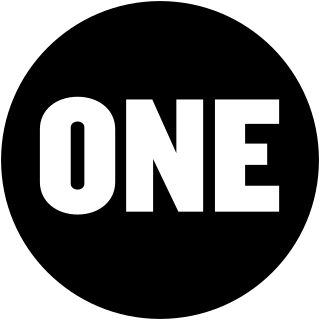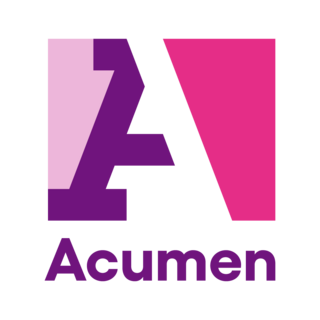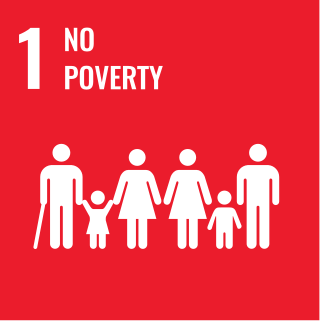
Extreme poverty is defined by the United Nations (UN) as "a condition characterized by severe deprivation of basic human needs, including food, safe drinking water, sanitation facilities, health, shelter, education and information. It depends not only on income but also on access to services". Historically, other definitions have been proposed within the United Nations.

Beadwork is the art or craft of attaching beads to one another by stringing them onto a thread or thin wire with a sewing or beading needle or sewing them to cloth. Beads are produced in a diverse range of materials, shapes, and sizes, and vary by the kind of art produced. Most often, beadwork is a form of personal adornment, but it also commonly makes up other artworks.

Poverty is a state or condition in which an individual lacks the financial resources and essentials for a certain standard of living. Poverty can have diverse environmental, legal, social, economic, and political causes and effects. When evaluating poverty in statistics or economics there are two main measures: absolute poverty which compares income against the amount needed to meet basic personal needs, such as food, clothing, and shelter; secondly, relative poverty measures when a person cannot meet a minimum level of living standards, compared to others in the same time and place. The definition of relative poverty varies from one country to another, or from one society to another.

Homeless shelters are a type of homeless service agency which provide temporary residence for homeless individuals and families. Shelters exist to provide residents with safety and protection from exposure to the weather while simultaneously reducing the environmental impact on the community. They are similar to, but distinguishable from, various types of emergency shelters, which are typically operated for specific circumstances and populations—fleeing natural disasters or abusive social circumstances. Extreme weather conditions create problems similar to disaster management scenarios, and are handled with warming centers, which typically operate for short durations during adverse weather.

ONE Campaign is an international, non-partisan, non-profit organization advocating for the investments needed to create economic opportunities and healthier lives in Africa. The campaigning organization uses data, grassroots activism, political engagement, and strategic partnerships to get political leaders to support policies and programs that save lives and improve futures.

Poverty reduction, poverty relief, or poverty alleviation is a set of measures, both economic and humanitarian, that are intended to permanently lift people out of poverty.
A micro-enterprise is generally defined as a small business employing nine people or fewer, and having a balance sheet or turnover less than a certain amount. The terms microenterprise and microbusiness have the same meaning, though traditionally when referring to a small business financed by microcredit the term microenterprise is often used. Similarly, when referring to a small, usually legal business that is not financed by microcredit, the term microbusiness is often used. Internationally, most microenterprises are family businesses employing one or two persons. Most microenterprise owners are primarily interested in earning a living to support themselves and their families. They only grow the business when something in their lives changes and they need to generate a larger income. According to information found on the Census.gov website, microenterprises make up 95% of the 28 million US companies tracked by the census.
Opportunity International is a 501(c)(3) nonprofit organization chartered in the United States. Through a network of 47 program and support partners, Opportunity International provides small business loans, savings, insurance and training to more than 14 million people in the developing world. It has clients in more than 20 countries and works with fundraising partners in the United States, Australia, Canada, Germany, Switzerland, Singapore, Hong Kong and the United Kingdom. Opportunity International has 501(c)(3) status as a tax-exempt charitable organization in the United States under the US Internal Revenue Code.

Acumen is a nonprofit impact investment fund based in the U.S. that focuses on investing in social enterprises that serve low-income individuals. Acumen was founded in April 2001 by Jacqueline Novogratz. It aims to demonstrate that small amounts of philanthropic capital, combined with business acumen, can result in thriving enterprises that serve vast numbers of the poor. Over the years, Acumen has invested $154.4 million in 167 companies and has had a successful track record in sourcing and executing investment opportunities in the clean energy, education, financial inclusion, health care and agriculture sectors.

Freedom from Hunger is an international development nonprofit organization working in nineteen countries. Freedom from Hunger focuses on providing small loans and business education to poor women.

Poverty is measured in different ways by different bodies, both governmental and nongovernmental. Measurements can be absolute, which references a single standard, or relative, which is dependent on context. Poverty is widely understood to be multidimensional, comprising social, natural and economic factors situated within wider socio-political processes.

In the United States, poverty has both social and political implications. In 2020, there were 37.2 million people in poverty. Some of the many causes include income inequality, inflation, unemployment, debt traps and poor education. The majority of adults living in poverty are employed and have at least a high school education. Although the US is a relatively wealthy country by international standards, it has a persistently high poverty rate compared to other developed countries due in part to a less generous welfare system.

The Xhosa people, or Xhosa-speaking people are a Bantu ethnic group native to South Africa. They are the second largest ethnic group in South Africa and are native speakers of the isiXhosa language.

Me to We is a for-profit company selling lifestyle products, leadership training and travel experience. Me to We was founded in 2008 by brothers Craig and Marc Kielburger. ME to WE’s engagements with the Trudeau family came under scrutiny after Justin Trudeau’s government awarded WE Charity a contract to administer the proposed Canada Student Service Grant program.

Samasource Impact Sourcing, Inc., formerly known as Samasource and Sama, is a training-data company, focusing on annotating data for artificial intelligence algorithms. The company offers image, video, and sensor data annotation and validation for machine learning algorithms in industries including automotive, navigation, augmented reality, virtual reality, biotechnology, agriculture, manufacturing, and e-commerce. Sama's mission is to expand opportunity for low-income individuals through the digital economy. One of the first organizations to engage in impact sourcing, Sama trains workers in basic computer skills and pays a local living wage for their labor.
Nigeria had one of the world's highest economic growth rates, averaging 7.4% according to the Nigeria economic report that was released in July 2019 by the World Bank. Following the oil price collapse in 2014–2016, combined with negative production shocks, the gross domestic product (GDP) growth rate dropped to 2.7% in 2015. In 2016 during its first recession in 25 years, the economy contracted by 1.6%. Nationally, 43 percent of Nigerians live below the poverty line, while another 25 percent are vulnerable. For a country with massive wealth and a huge population to support commerce, a well-developed economy, and plenty of natural resources such as oil, the level of poverty remains unacceptable. However, poverty may have been overestimated due to the lack of information on the extremely huge informal sector of the economy, estimated at around 60% more, of the current GDP figures. As of 2018, the population growth rate is higher than the economic growth rate, leading to a slow rise in poverty. According to a 2018 report by the World Bank, almost half the population is living below the international poverty line, and unemployment peaked at 23.1%.
Poverty in Sri Lanka is 31% of the population as of June 8, 2023 Sri Lanka's life expectancy and literacy rate are nearly on par with those of developed countries, and even top the rankings for the South Asia region. While all these indicate that Sri Lanka should be experiencing a high standard of living, until recently it has only ranked in the medium category of the Human Development Index (HDI). This is despite the fact that Sri Lanka has been experiencing moderate growth in its GDP averaging 5.5 per annum between 2006 and 2009. One of the reasons is due to its relatively low GDP per capital;. The Sri Lankan government has been successful in reducing poverty from 15.2% on 2006 to 8.9% in 2010, urban poverty was reduced from 6.7 to 5.3% while rural poverty was reduced from 15.7 to 9.5%, and the nation has made significant progress towards achieving Millennium Development Goals on eradicating extreme poverty and hunger.
Economic globalization is one of the three main dimensions of globalization commonly found in academic literature, with the two others being political globalization and cultural globalization, as well as the general term of globalization. Economic globalization refers to the widespread international movement of goods, capital, services, technology and information. It is the increasing economic integration and interdependence of national, regional, and local economies across the world through an intensification of cross-border movement of goods, services, technologies and capital. Economic globalization primarily comprises the globalization of production, finance, markets, technology, organizational regimes, institutions, corporations, and people.
Bhutanese Americans are Americans of Bhutanese descent. According to the 2010 census there are 19,439 Americans of Bhutanese descent. However, many Nepali-Bhutanese came to the U.S. via Nepal as political refugees from that country and are registered as Nepali Americans; often leading to the actual numbers of Bhutanese Americans being underreported. More than 92,323 Bhutanese Nepalis have been resettled in the United States, with the largest single community being approximately 27,000 in Columbus, Ohio.

Sustainable Development Goal 1, one of the 17 Sustainable Development Goals established by the United Nations in 2015, calls for the end of poverty in all forms. The official wording is: "No Poverty". Member countries have pledged to "Leave No One Behind": underlying the goal is a "powerful commitment to leave no one behind and to reach those farthest behind first".














